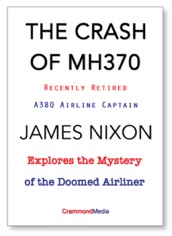Releasing Info Could Damage Relations
09/03/17 13:40
In his article in The Australian, Journalist Ean Higgins states:
"The Australian Transport Safety Bureau has rejected The Australian’s Freedom of Information request for copies of statements from a panel of international experts that it says supports its interpretation of satellite tracking data. The documents are central to the ATSB’s defence of its failed effort to find the plane.
Colin McNamara, the ATSB’s general manager, strategic capability, said disclosure of the documents “would, or could reasonably be expected to, cause damage to the international relations of the commonwealth”."
Hear Hear.
If you have read my book you will know about the delay between the loss of the aircraft and the issuing of a Distress Phase … over four hours. Then a further five hours before a search plane took off.
Had the Distress Phase been issued in accordance with ICAO treaties, (exactly an hour after MH370 was lost), then maybe the Indonesian, Thai and Indian ATCs would have seen the aircraft on their primary radar screens.
Oh, to be a fly on the wall of the ATSB meeting room when that data arrived.
Full of investigators, whose role is not to apportion blame, their comments could start an international incident.
If it was a crew room of pilots, it could've started a war.
Sitting-up there in the dark, we expect the ATC process to kick-in if something happens.
Malaysia's did not.
The real question is: "Can Malaysia guarantee that their ATC system has been fixed?"
If not, maybe we should be avoiding their airspace.
Ean Higgins' Article (Page 2 The Australian Mar 8th, 2017) is HERE
"The Australian Transport Safety Bureau has rejected The Australian’s Freedom of Information request for copies of statements from a panel of international experts that it says supports its interpretation of satellite tracking data. The documents are central to the ATSB’s defence of its failed effort to find the plane.
Colin McNamara, the ATSB’s general manager, strategic capability, said disclosure of the documents “would, or could reasonably be expected to, cause damage to the international relations of the commonwealth”."
Hear Hear.
If you have read my book you will know about the delay between the loss of the aircraft and the issuing of a Distress Phase … over four hours. Then a further five hours before a search plane took off.
Had the Distress Phase been issued in accordance with ICAO treaties, (exactly an hour after MH370 was lost), then maybe the Indonesian, Thai and Indian ATCs would have seen the aircraft on their primary radar screens.
Oh, to be a fly on the wall of the ATSB meeting room when that data arrived.
Full of investigators, whose role is not to apportion blame, their comments could start an international incident.
If it was a crew room of pilots, it could've started a war.
Sitting-up there in the dark, we expect the ATC process to kick-in if something happens.
Malaysia's did not.
The real question is: "Can Malaysia guarantee that their ATC system has been fixed?"
If not, maybe we should be avoiding their airspace.
Ean Higgins' Article (Page 2 The Australian Mar 8th, 2017) is HERE
"The Crash Of MH370" tells you all about Malaysia's ATC performance.



